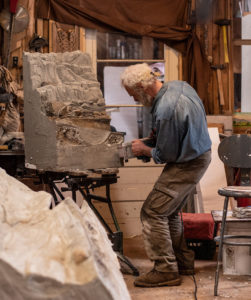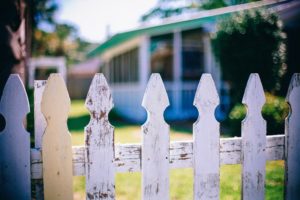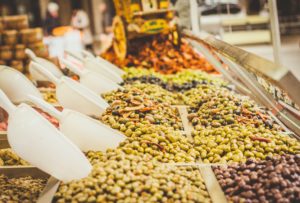Exposing Gaps
The COVID-19 pandemic’s tragic consequences around the world continue to leave a trail of suffering. It has also exposed gaps in our lifestyles, government systems, and work life. The pandemic has highlighted how unsustainable our lifestyles, particularly in the Western world, can be. This is especially true for young families living in expensive cities, with a mortgage or expensive rent. When jobs stop and paychecks disappear, many households are left – within a short two or three months – with a disastrous shortfall in income. Uncertainty abounds, and takes its toll on our mental and physical health.
An article in Politico Magazine recently compared the scale of the coronavirus crisis to other life-changing events in history that have reshaped society in lasting ways. American sociologist and author Eric Klinenberg writes, “The coronavirus pandemic marks the end of our romance with market society and hyper-individualism.”1
Health officials worked hard to get the world to take the pandemic seriously, but cash crunches got our attention immediately. Many of us assumed the ground beneath our feet was pretty solid – now, not so much. Crisis moments like this are true eye-openers, but also bring fear and anxiety. However, they can have the additional effect of allowing new opportunities and positive changes to enter our lives through the back door.
For over 150 years, we have built our economy on two assumptions. First, we must protect the market because it gives us what we want. Secondly, when whatever crisis we’re experiencing is over (and there have been many crises in the past 150 years) the market will behave “properly” again, and we’ll return to getting what we want without having to change anything.
These assumptions are wrapped around the belief that we get paid for what we do because we provide a certain amount of value. This “value” is translated into monthly salaries, which we then exchange for the products and services that others provide for us. Tit-for-tat. Transactional existence. Or what economists call “exchange value”.
Simon Mair is an Ecological Economist at the University of Surrey, who works at the Centre for the Understanding of Sustainable Prosperity. He recently wrote an article for BBC Future, in which he points out that “currently, the primary aim of the global economy is to facilitate exchanges of money.”2
His article also poses this compelling question: “Could the huge shifts in our way of life, being introduced as part of the fight against COVID-19, pave the way for a more humane economy?”
Who and What is Essential?
As our governments identify the “essential services” within our communities during this pandemic, some folks are following that train of thought and starting to wonder if many of our jobs – perhaps the vast majority – are indeed not as essential as we thought. It can be somewhat deflating, though I think we’ve also gained a whole new perspective and deep appreciation for people like healthcare workers, janitors and cleaners, garbage collectors, grocery store clerks, truck drivers, road repair crews, farmers, all those who help harvest the crops, and other food industry workers.
For many decades, a lot of us have bought into the explanation that we are obligated to work in our “nonessential jobs” in order to keep the marketplace healthy. We exchange value – our salaries – for the essential goods of life, and that helps keeps everyone afloat, right? The cracks in that scenario are becoming increasingly visible, and many are starting to ask some intriguing and sometimes uncomfortable questions. Here’s one that I’ve been asking myself: “Are we as a society using our collective resources mainly to increase exchanges of money, or to increase quality of life?”
Here’s some food for thought from Walter Brueggemann, Peter Block and John McKnight in their thought-provoking book An Other Kingdom: Departing the Consumer Culture:
Economic systems based on competition, scarcity and acquisition have become more than a question of economics; they have become a kingdom within which we dwell. That way of thinking invades our social order, our ways of being together, and what we value. It replicates the kingdom of ancient Egypt, Pharaoh’s kingdom. It produces a consumer culture that centralizes wealth and power and leaves the rest wanting what the beneficiaries of the system have.”3
This rings true, especially as I have time at the moment to stop and look around me. Our consumer society has had a profound effect on us, and determines how we interact most of the time. This market-exchange approach takes precedence over other non-cash priorities, such as our most precious commodity – our time. Too often we’ve chosen the cash and the goodies, and given up time for ourselves, our families, our neighbours, and our community. We have been encouraged to pride ourselves on our ability to earn money and shop for our needs. Our attention has wandered away from “non-essential” concerns, such as exploring that deep calling inside us, using our inborn gifts to help our neighbours, diving into roles that come naturally to us, asking for help, discovering the joys of simplicity and living with less, making art, collaborating on projects with others, and seeking meaningful work.
John McKnight and Peter Block, two of the trio who wrote An Other Kingdom, go even further in The Abundant Community: Awakening the Power of Families and Neighborhoods:
The essential promise of a consumer society is that satisfaction can be purchased. This promise runs so deep in us that we have come to take our identity from our capacity to purchase. To borrow from Descartes, “I shop, therefore I am.” This dependency on shopping is not just about things; it includes the belief that most of what is fulfilling or needed in life can be bought – from happiness to healing, from love to laughter, from rearing a child to caring for someone at the end of life.”4
To put it in economists’ lingo, we have become commodities. Like me, do you see shades of Pharaoh’s Egyptian economy? As a Jew, my bones remember my predecessors yearning for another way of life, to escape the grasp of the Pharaoh, to get away from Egypt.
Much like my ancestors, some of us might be unsure where the exodus is taking us. But I agree with McKnight and Block that we don’t actually have to go anywhere. The Promised Land is already here – the land of community and interdependence, where we can realize our greatest desires by serving one another in complementary ways.
A New Normal
One thing that we almost all agree on is that the pandemic is bringing change. History tells us that social change can come from many sources and inspirations. My hope is that many of us play proactive roles in proposing new social forms that involve an ethic that values care for others and brings civic life back to society.
My adult children, all millennials, have been operating this way for years. They have been modelling a new operating system, a new type of exchange that our government, businesses, and institutions do not offer. And my kids are not the only ones with a different vision for themselves and their communities.
The fact is that we all have gifts and capacities. Whether they are inborn or willed into existence, or whether some have more and others less, is not the point. Ironically, while we are often oblivious to what we have to contribute, it’s usually quite obvious to those close to us. Many of us have never felt truly affirmed in our giftings, and never been invited to join with others and give them away. Perhaps this is a key part of a new operating system – we all need to remind those around us that they are valuable, and invite them to share their talents and resources.
If we want to replace our market-based culture, we need to offer something else. I would like to suggest that we move from a culture of depletion to a culture of donation. In other words, instead of being “used” by our market economy, we set our sights on a collaborative economy – one which nurtures creative investment. We already do this in both small and big ways through our charitable efforts, and it is within our grasp to leverage this power.
A few adaptations in work and business life would go a long way in making change possible, but they require economic imagination. For example, some countries are starting to buy into the idea of providing a full or partial basic income to their citizens, to ensure that everyone has enough to meet their basic needs. Reducing the working week, job-sharing, and tax credits for volunteering are other approaches that are well within our grasp. Another key strategy is reducing our living costs.
I’ve recently been reading about a trend, especially among young adults, to move to less expensive towns near cities, or to small towns in rural areas. There has been a movement away from major centres in Canada, including Toronto, Montreal and Vancouver. People are pining for a less expensive, simpler way of life, one in which you can walk or ride your bike to work or maybe start your own business, get to know your neighbours, become involved in community affairs, and more easily afford to buy your own home.
This reminds me of a social experiment that a good friend of mine created with a few of his pals from Los Angeles in the late 1970’s. Working in the film industry, they questioned the paradigm of being unable to control their time, as they found themselves either working very long hours or not working at all for stretches of time, living at the beck and call of the bosses in the movie studios.
They decided to move together to Brownsville, Oregon, an idyllic small town (known now as the location where the movie Stand By Me was shot in 1986.) Rent in Brownsville was far cheaper, and most of the food they ate was grown locally. The friends made a list of their 150 most common purchases, everything from food to furniture to socks. They started a co-op, and soon many other Brownsville residents became members. Becoming a member meant you also helped to staff the co-op. By ordering directly from producers, and bypassing the cost of staffing, products could be offered to members at a dramatically reduced price. As the number of members grew, they each only had to work four hours per month at the co-op. Many had other jobs in the community as well, but they found that because of the cost savings of food and other items through membership at the co-op, they no longer had to work a 40-hour work week. Working part time, they still had enough money for everything they required – and now had more time for family, leisure, hobbies, volunteer service, and pursuing new interests.
The co-op provided more than a supply chain of food and other staples. Above all, it created community. Members and their families became good friends, sharing their time, talent and treasure. I visited my friend in Brownsville a few times, and yes, there were challenges, and sometimes tensions built up – but they were almost always able to sit down, listen to each other, and figure out a solution. Each time I visited, I came away impressed and encouraged by what I saw. There was an underlying sense of trust in the community, as they worked together for the common good.
Proposing these types of initiatives to government, business and institutions usually meets with resistance. They seem impossible to even imagine…until a crisis like COVID-19 forces us to consider new ways of being. When enough people let themselves become agents of discovery and instruments of invitation to others, we all benefit. In the end, it gives hope in times of trouble, and reveals value where there seemed to be shortfall. Perhaps most importantly, it builds resilience and connectivity – which are crucial elements for the future of our world.
To quote Licia Corbella, a columnist in our local newspaper in Calgary, “Many of our idols have been torn down. The frivolous has been replaced by the essential; the superficial with the profound. That’s one of the blessings that has come out of the pandemic. We are finally valuing the things that truly matter.”
- Eric Klinenberg and others (2020, March). Coronavirus will change the world permanently. Here’s how. Politico. From www.politico.com.
- Simon Mair (2020, March). How will coronavirus change the world? BBC Future. From www.bbc.com/future.
- Block, Peter, Brueggemann, Walter & McKnight, John (2016). An Other Kingdom: Departing the Consumer Culture (p. xiv). Hoboken, NJ: John Wiley & Sons.
- Block, Peter & McKnight, John (2010). The Abundant Community: Awakening the Power of Families and Neighborhoods (p. 9). San Francisco, CA: Berrett-Koehler Publishers.












